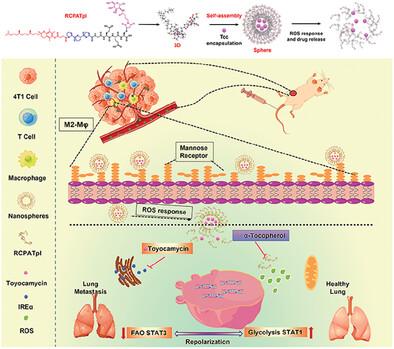Our official English website, www.x-mol.net, welcomes your
feedback! (Note: you will need to create a separate account there.)
Supramolecular Peptide Amphiphile Nanospheres Reprogram Tumor-associated Macrophage to Reshape the Immune Microenvironment for Enhanced Breast Cancer Immunotherapy
Small ( IF 13.0 ) Pub Date : 2023-12-15 , DOI: 10.1002/smll.202307390 Qiuqun Xiao 1, 2 , Jinyan Huang 2 , Xing Wang 2 , Zehong Chen 2 , Weiqi Zhang 3 , Fengjiao Liu 1 , Jiejing Li 1 , Zhimou Yang 2, 4 , Jie Zhan 5 , Yanbin Cai 1, 6
Small ( IF 13.0 ) Pub Date : 2023-12-15 , DOI: 10.1002/smll.202307390 Qiuqun Xiao 1, 2 , Jinyan Huang 2 , Xing Wang 2 , Zehong Chen 2 , Weiqi Zhang 3 , Fengjiao Liu 1 , Jiejing Li 1 , Zhimou Yang 2, 4 , Jie Zhan 5 , Yanbin Cai 1, 6
Affiliation

|
Tumor immunotherapy has become a research hotspot in cancer treatment, with macrophages playing a crucial role in tumor development. However, the tumor microenvironment restricts macrophage functionality, limiting their therapeutic potential. Therefore, modulating macrophage function and polarization is essential for enhancing tumor immunotherapy outcomes. Here, a supramolecular peptide amphiphile drug-delivery system (SPADS) is utilized to reprogram macrophages and reshape the tumor immune microenvironment (TIM) for immune-based therapies. The approach involved designing highly specific SPADS that selectively targets surface receptors of M2-type macrophages (M2-Mφ). These targeted peptides induced M2-Mφ repolarization into M1-type macrophages by dual inhibition of endoplasmic reticulum and oxidative stresses, resulting in improved macrophagic antitumor activity and immunoregulatory function. Additionally, TIM reshaping disrupted the immune evasion mechanisms employed by tumor cells, leading to increased infiltration, and activation of immune cells. Furthermore, the synergistic effect of macrophage reshaping and anti-PD-1 antibody (aPD-1) therapy significantly improved the immune system's ability to recognize and eliminate tumor cells, thereby enhancing tumor immunotherapy efficacy. SPADS utilization also induced lung metastasis suppression. Overall, this study demonstrates the potential of SPADS to drive macrophage reprogramming and reshape TIM, providing new insights, and directions for developing more effective immunotherapeutic approaches in cancer treatment.
中文翻译:

超分子肽两亲物纳米球重新编程肿瘤相关巨噬细胞以重塑免疫微环境以增强乳腺癌免疫治疗
肿瘤免疫治疗已成为癌症治疗的研究热点,巨噬细胞在肿瘤发生发展中发挥着至关重要的作用。然而,肿瘤微环境限制了巨噬细胞的功能,限制了它们的治疗潜力。因此,调节巨噬细胞功能和极化对于增强肿瘤免疫治疗效果至关重要。在这里,超分子肽两亲药物递送系统 (SPADS) 用于重新编程巨噬细胞并重塑肿瘤免疫微环境 (TIM),以进行基于免疫的治疗。该方法涉及设计高度特异性的 SPADS,选择性地靶向 M2 型巨噬细胞 (M2-Mφ) 的表面受体。这些靶向肽通过内质网和氧化应激的双重抑制诱导M2-Mφ复极化为M1型巨噬细胞,从而改善巨噬细胞的抗肿瘤活性和免疫调节功能。此外,TIM 重塑破坏了肿瘤细胞采用的免疫逃避机制,导致免疫细胞浸润增加和激活。此外,巨噬细胞重塑和抗PD-1抗体(aPD-1)治疗的协同作用显着提高了免疫系统识别和消除肿瘤细胞的能力,从而增强肿瘤免疫治疗的疗效。 SPADS 的利用还诱导肺转移抑制。总的来说,这项研究证明了 SPADS 驱动巨噬细胞重编程和重塑 TIM 的潜力,为开发更有效的癌症治疗免疫治疗方法提供了新的见解和方向。
更新日期:2023-12-15
中文翻译:

超分子肽两亲物纳米球重新编程肿瘤相关巨噬细胞以重塑免疫微环境以增强乳腺癌免疫治疗
肿瘤免疫治疗已成为癌症治疗的研究热点,巨噬细胞在肿瘤发生发展中发挥着至关重要的作用。然而,肿瘤微环境限制了巨噬细胞的功能,限制了它们的治疗潜力。因此,调节巨噬细胞功能和极化对于增强肿瘤免疫治疗效果至关重要。在这里,超分子肽两亲药物递送系统 (SPADS) 用于重新编程巨噬细胞并重塑肿瘤免疫微环境 (TIM),以进行基于免疫的治疗。该方法涉及设计高度特异性的 SPADS,选择性地靶向 M2 型巨噬细胞 (M2-Mφ) 的表面受体。这些靶向肽通过内质网和氧化应激的双重抑制诱导M2-Mφ复极化为M1型巨噬细胞,从而改善巨噬细胞的抗肿瘤活性和免疫调节功能。此外,TIM 重塑破坏了肿瘤细胞采用的免疫逃避机制,导致免疫细胞浸润增加和激活。此外,巨噬细胞重塑和抗PD-1抗体(aPD-1)治疗的协同作用显着提高了免疫系统识别和消除肿瘤细胞的能力,从而增强肿瘤免疫治疗的疗效。 SPADS 的利用还诱导肺转移抑制。总的来说,这项研究证明了 SPADS 驱动巨噬细胞重编程和重塑 TIM 的潜力,为开发更有效的癌症治疗免疫治疗方法提供了新的见解和方向。













































 京公网安备 11010802027423号
京公网安备 11010802027423号